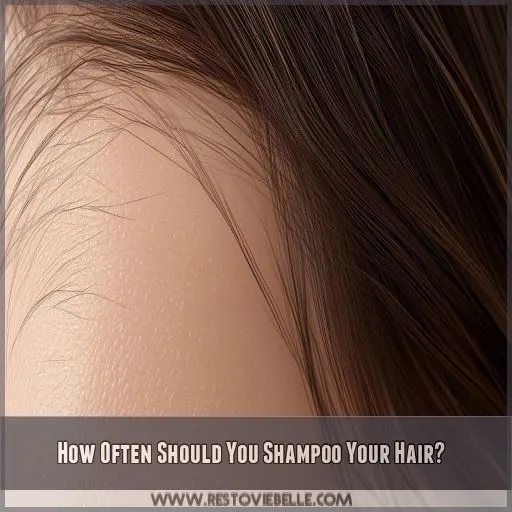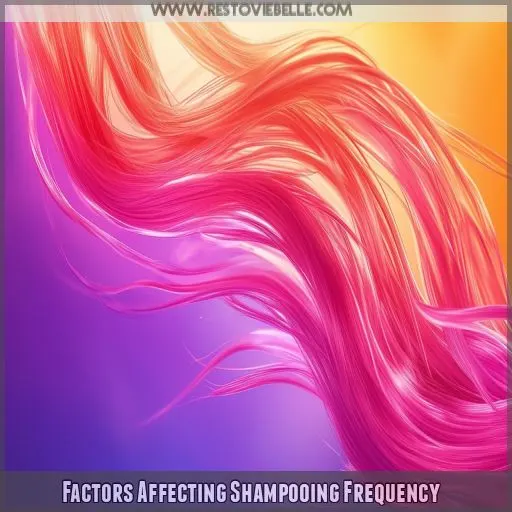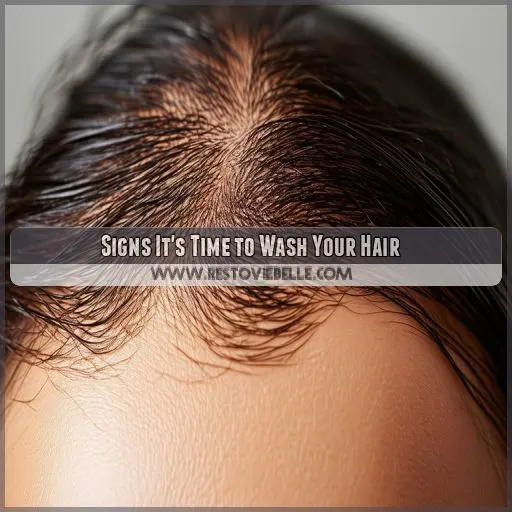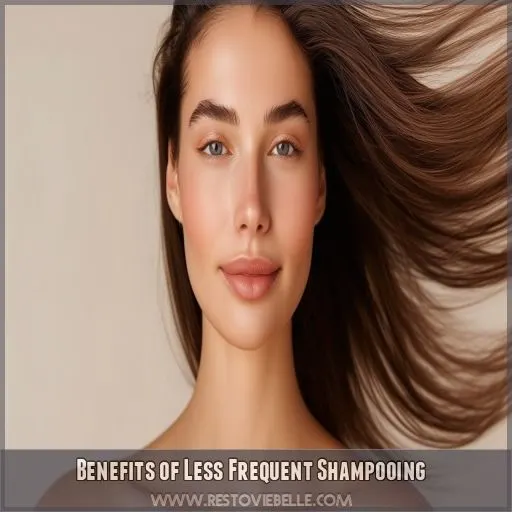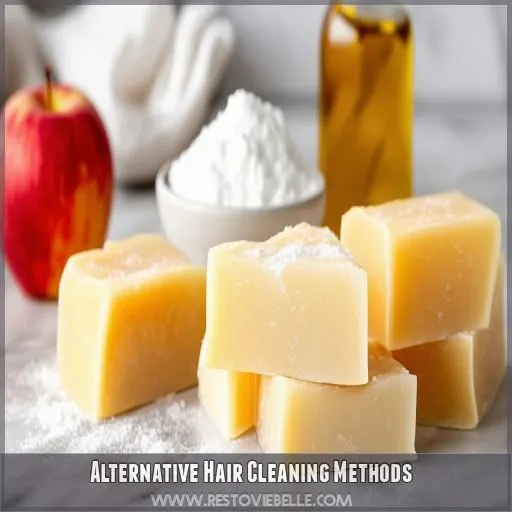This site is supported by our readers. We may earn a commission, at no cost to you, if you purchase through links.
 How frequently should you shampoo your hair? It depends on your hair type, scalp condition, lifestyle, and environment. Fine hair and frequent styling may require daily or every other day washing, while long, thick hair might need just thrice a week.
How frequently should you shampoo your hair? It depends on your hair type, scalp condition, lifestyle, and environment. Fine hair and frequent styling may require daily or every other day washing, while long, thick hair might need just thrice a week.
Key factors include oil production, scalp health, and activity level. Look for signs like an itchy scalp, greasy hair, or falling apart styles. Less frequent washing can preserve natural oils, reduce breakage, and maintain scalp health.
Alternatives like dry shampoo, co-washing, or water-only washing can also help. Want to find your perfect routine? Let’s embark on an exploration!
Table Of Contents
- Key Takeaways
- How Frequently Should You Shampoo Your Hair?
- How Often Should You Shampoo Your Hair?
- Factors Affecting Shampooing Frequency
- Signs It’s Time to Wash Your Hair
- Benefits of Less Frequent Shampooing
- Alternative Hair Cleaning Methods
- Frequently Asked Questions (FAQs)
- Is it okay if I shampoo my hair everyday?
- How often should you shampoo your hair to keep it healthy?
- What are the benefits of not washing your hair for a week?
- Is it OK to shampoo your hair 3 times?
- How often should you shampoo?
- How often should one wash their hair for excessive hair growth?
- How long should you use a hair shampoo?
- How often should you shampoo a dry scalp?
- How often should you shampoo & conditioner?
- How often should I wash my hair?
- What are the best shampoos for colored hair?
- Can using hard water affect hair health?
- How should you treat scalp psoriasis?
- Do lifestyle changes impact hair washing needs?
- Can dry shampoo cause scalp issues?
- Conclusion
Key Takeaways
- Shampoo frequency depends on your hair type, scalp condition, lifestyle, and environment. It’s not a one-size-fits-all situation, and there’s no shame in washing your hair every day or every other day if that’s what works for you.
- Less frequent shampooing can be beneficial for your hair and scalp. It can help preserve your hair’s natural oils, reduce breakage, and maintain scalp health.
- If you’re not sure how often you should shampoo your hair, start by washing it once or twice a week and adjust the frequency based on how your hair and scalp respond.
- There are a number of alternative hair cleaning methods you can try if you want to wash your hair less frequently, such as dry shampoo, co-washing, or water-only washing.
How Frequently Should You Shampoo Your Hair?
How frequently should you shampoo your hair? It depends on your hair type and lifestyle, but generally, every 2-3 days is recommended.
How Often Should You Shampoo Your Hair?
Determining how often to shampoo your hair boils down to your specific needs and preferences. It’s not a one-size-fits-all answer. Hair texture and length play significant roles.
If you have fine hair and use styling products frequently, shampooing every day or every other day might be necessary to remove product buildup.
For those with longer, thicker hair, washing three times a week might suffice. Additionally, water quality impacts how well your hair responds to repeated washing.
Factors Affecting Shampooing Frequency
Shampooing frequency depends on several factors, including your hair type, scalp condition, lifestyle, activity level, and environment. Understanding these variables helps you tailor a hair care routine that maintains both scalp and hair health effectively.
Hair Type
Understanding your hair type is essential in determining how often you should shampoo. Consider factors such as:
- Hair porosity: Determines how well your hair absorbs and retains moisture.
- Curl pattern: Curly hair tends to be drier.
- Oil production: Thick hair produces less oil.
- Use of conditioners: Can influence washing needs.
Scalp Condition
Your scalp condition significantly impacts how often you should shampoo. If you experience scalp irritation, dryness, or seborrheic dermatitis, frequent washing with shampoos containing ingredients like selenium sulfide or zinc pyrithione can help. Maintaining scalp hygiene is essential for overall scalp health and to prevent inflammation and irritation.
Lifestyle and Activity Level
Your activity level directly influences how often you should shampoo. If you exercise frequently or spend a lot of time outdoors, you may need to wash more often to remove sweat and dirt buildup. Lifestyle habits impact oil production and hair condition.
- Higher exercise frequency increases oil buildup.
- Outdoor activities expose hair to pollutants.
- Active lifestyle may necessitate frequent washes.
Climate and Environment
The climate and environment you live in can also impact your hair washing needs. In humid climates, you may need to shampoo more frequently to combat excess oil and product buildup. Dry, cold weather can strip moisture, requiring less washing and more conditioning treatments. Pollution and hard water may necessitate clarifying shampoos.
Signs It’s Time to Wash Your Hair
You’ll know it’s time to wash your hair when you notice certain signs, such as:
- Itchy Scalp: Persistent itchiness can indicate dirt buildup.
- Greasy Hair: Hair that looks and feels greasy or limp.
- Dandruff: Flaking and dandruff may suggest the need for cleansing.
- Style Falling Apart: If your style doesn’t hold, it might be due to excessive oil or product buildup.
Ignoring these signs can lead to brittle hair, breakage, and hair shedding.
Benefits of Less Frequent Shampooing
Shampooing less frequently helps preserve your hair’s natural oils, which are essential for keeping it moisturized and healthy. This practice can also reduce hair breakage and maintain your scalp’s health by minimizing irritation and over-cleansing.
Preserve Natural Oils
Preserving natural oils is essential for maintaining healthy hair and scalp.
Over-shampooing can strip hair of these oils, leading to dry hair and potential hair damage.
By shampooing less frequently, you allow natural moisture to nourish your hair and scalp, which aids in regulating oil production.
Focus on shampooing roots only to clean your scalp effectively without compromising the natural oils that protect and maintain hair health.
Reduce Hair Breakage
Shampooing less frequently also helps reduce hairage. Over-washing strips your hair of its natural oils, leading to dry, brittle strands more prone to snapping.
Maintain Scalp Health
Shampooing less frequently can maintain scalp health by preventing dry scalp and oily roots. When you over-wash, it strips away natural oils, leading to scalp irritation and even dandruff.
Alternative Hair Cleaning Methods
You can keep your hair feeling fresh between washes by using alternative methods like dry shampoo, co-washing, and water-only washing. Each method helps maintain cleanliness, reduce oiliness, and protect your hair’s natural moisture balance.
Dry Shampoo
To maintain hair health, dry shampoo is a handy tool. It absorbs oils, adds volume, and freshens hair between washes. Here’s how to use it:
- Dry Shampoo Application: Hold the can 6 inches away and spray at roots.
- Avoid Residue: Brush your hair thoroughly to remove excess.
- Consider Brands: Choose reputable dry shampoo brands with minimal harsh ingredients.
Use it sparingly to prevent buildup.
Co-washing
Co-washing, or using conditioner to wash your hair, can be a boon, especially for curly hair. It helps maintain curl definition by keeping the hair well-hydrated.
Co-washing reduces scalp irritation and prevents product buildup that shampoos might leave behind. By skipping the harsh detergents in shampoos, you preserve natural oils, boosting overall hair health.
This method is gentle yet effective, especially if you have delicate or chemically processed hair.
Water-only Washing
Shifting from co-washing, water-only washing might be your next step to preserve scalp health and hair growth. By rinsing with water alone, you eliminate product buildup and reduce scalp irritation.
This method allows your hair’s natural oils to maintain moisture balance, fostering a healthier scalp environment. While it may take time to adjust, many find their hair feels cleaner and more manageable over time.
Frequently Asked Questions (FAQs)
Is it okay if I shampoo my hair everyday?
You can shampoo daily if you have fine hair exercise frequently, or live in a humid climate. However, washing too often can dry out or damage hair, especially if it’s thick, curly, or chemically processed.
How often should you shampoo your hair to keep it healthy?
Shampoo your hair 1-2 times per week. Adjust based on your hair type: more frequently for oily scalps, less for dry or curly hair. This helps maintain natural oils, preventing dryness and breakage.
What are the benefits of not washing your hair for a week?
Imagine silk threads retaining their sheen—a week without washing your hair can preserve natural oils, prevent breakage, maintain scalp health, and enhance overall hair strength. Embrace your hair’s natural rhythm for healthier locks.
Is it OK to shampoo your hair 3 times?
Yes, you can shampoo your hair three times a week. It’s appropriate if you have very oily hair, exercise frequently, or live in a humid climate. Make sure you’re not stripping your hair of its natural oils.
How often should you shampoo?
You should shampoo your hair based on its texture and oiliness. Typically, washing 1-2 times per week suffices for most, but oily hair may need more frequent cleaning, while dry or curly hair requires less.
How often should one wash their hair for excessive hair growth?
To stimulate excessive hair growth, focus more on a balanced diet and less on shampooing frequency. While clean hair can promote scalp health, over-washing strips essential oils, potentially hindering growth. Aim for 1-2 washes weekly.
How long should you use a hair shampoo?
You should use your hair shampoo until the hair is thoroughly cleansed, typically a few minutes. Make sure you rinse it out completely to avoid residue, which can lead to buildup and scalp irritation.
How often should you shampoo a dry scalp?
For a dry scalp, shampooing 1-2 times per week is ideal. This frequency maintains natural oils, preventing dryness and irritation. Additionally, use moisturizing conditioners to support scalp health and hydration.
How often should you shampoo & conditioner?
You should shampoo and condition your hair 1-2 times a week for dryness. For oily scalps, increase to 2-3 times weekly. Adjust based on hair type, age, and activity level for the best care.
How often should I wash my hair?
Did you know 60% of people can wash their hair just once a week? Thicker hair producing less oil requires fewer washes, while fine or oily hair might need more frequent cleansing to maintain scalp health and cleanliness.
What are the best shampoos for colored hair?
Look for shampoos labeled as "sulfate-free" and "color-safe" to protect your colored hair. Brands like Pureology, Olaplex, and Redken offer excellent options. Hydration and UV protection are key features to seek in these products.
Can using hard water affect hair health?
Using hard water is like trying to wash away mud with thick syrup. The minerals in hard water can cause hair to become brittle, dull, and prone to buildup, impacting overall hair health negatively.
How should you treat scalp psoriasis?
Treat scalp psoriasis by using medicated shampoos containing coal tar or salicylic acid, applying topical steroids or vitamin D analogs, and moisturizing regularly. Consult a dermatologist for personalized treatment if symptoms persist.
Do lifestyle changes impact hair washing needs?
Ironically, a busy lifestyle means less need for frequent hair washing. Regular workouts, pollution exposure, and product use will prompt more washes. However, natural oils, beneficial for hair health, often reduce the need for shampoo.
Can dry shampoo cause scalp issues?
Yes, using dry shampoo excessively can lead to scalp issues, including buildup, irritation, and clogged pores. It’s important to wash it out regularly and not rely on it as a permanent substitute for regular shampooing.
Conclusion
Finally, finding your perfect hair-washing routine hinges on several factors.
Understand how frequently you should shampoo your hair by considering your hair type, scalp condition, lifestyle, and surroundings.
Signs like greasiness and itching signal it’s time to wash. Less frequent washing preserves natural oils, reduces breakage, and ensures scalp health.
Alternatives like dry shampoo, co-washing, or water-only washing can complement your regimen.
Adjusting your approach will help maintain healthy, clean hair well-suited to your unique needs.

